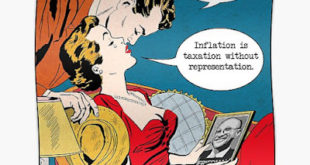In 1967, Milton Friedman launched a counterrevolution in economics that overturned the Keynesian theory of inflation. Three years later, economist James Tobin issued a powerful theoretical rebuttal — but in the economics mainstream, it’s been all but forgotten.Read full interview here.
Read More »The debt ceiling and the American economy: not Armageddon
There is a lot of discussion about the debt ceiling, most of it somewhat exaggerated and panicky. In a recent WAPO op-ed it was called Financial Armageddon. From a run on the dollar to the complete collapse of the economy, one can find almost anything in the news. And sure enough there are reasons to be more concerned this time than in previous disputes between a Republican House and a Democratic White House, which is always the pattern when it comes to the debt ceiling, an institutional...
Read More »Is dependency over?
[embedded content]Short clip of part of an interview. I discussed that in an old paper here, and in another interview here.
Read More »The problem with Keynes’ General Theory: by Tom Palley
New working paper by Tom Palley. From the abstract:Keynes' General Theory was a massive step forward relative to classical economics, but it was also a step backward in its denial of the conflictual nature of capitalism. There is need to understand Keynes' technical contributions regarding the workings of monetary economies, but also need to understand the flaws within his thinking and the consequences thereof. Keynes made a fundamental contribution elucidating the mechanism of effective...
Read More »Lavoie on Inflation Theory: Conflicting claims versus the NAIRU
New Paper by Julia Braga and Franklin Serrano. From the abstract: The conflicting claims approach to the theory of inflation so thoroughly surveyed and well presented in Chapter 8 of Lavoie’s (2022) book is deservedly becoming increasingly consensual among heterodox (and even some notable mainstream) macroeconomists. However, the relevance of a concept (and the very existence of) a NAIRU (Non-Accelerating Inflation Rate of Unemployment) derived consistently from the very premises of the...
Read More »On central bank independence and the public good
The debate between Tom Palley and Steve Kamin on central bank independence and the several rescues of banks after financial crises, including the more recent rescue of the Silicon Valley Bank.[embedded content]Tom suggests that central banks are dominated by financial interests, and that this has been a problem. At the same time he avoids the libertarian notion of free banking, and suggests that a central bank at the service of public interest would require alternative views, I would...
Read More »My talk at UNAM on Demand-pull and Oligopolistic Inflation
[embedded content]My talk (in Spanish) at the Instituto de Investigaciones Económicas of UNAM (virtually) on inflation. The talk starts at minute 20 or so.
Read More »On Re-Industrialization: Brief Comment on Krugman’s column
I have written on deindustrialization before (see here and here), and commented on the CHIPS Act, and how it was one of the first, if not the first, re-shoring of manufacturing jobs into the US. Krugman just wrote a column on that, noting that the concern with manufacturing is now bipartisan, as Biden policies follow Trump's, he argues the former more successfully than the latter. Also, I should note that the the pressures for US corporations to reorganize their supply chains away from China...
Read More »Distributive Conflict and the “New” Inflation
[embedded content]Franklin Serrano on inflation (in Portuguese). More or less what I have been saying on the issue, with some interesting discussions on the changes in the New Consensus Model, and the changing views of some of the key authors like Larry Summers.
Read More »Review of Crotty’s “Keynes Against Capitalism” (forthcoming in ROKE)
It should not be a surprise that John Maynard Keynes is often seen as being relatively conservative by many progressively inclined or radical economists, that often tend to prefer the views of Michal Kalecki, or the more radical approach of Keynes’ favorite disciple, Joan Robinson. That is not the case in James Crotty’s book Keynes Against Capitalism, who takes a diametrically opposite view. He tells us that: “It is almost universally believed that Keynes wrote his magnum opus, The General...
Read More » Naked Keynesianism
Naked Keynesianism




-310x165.png)
